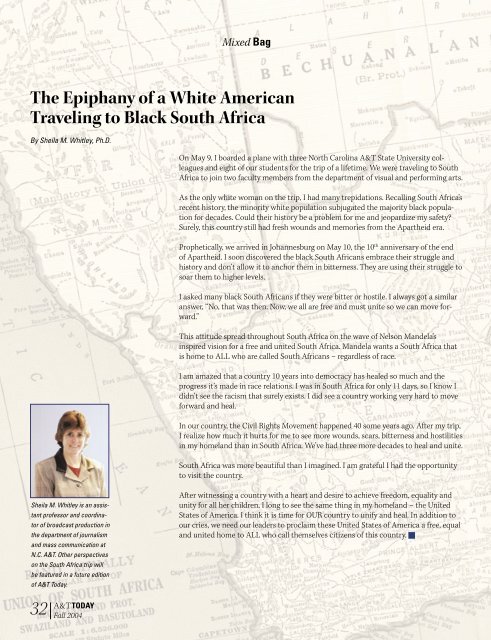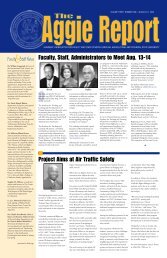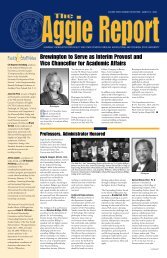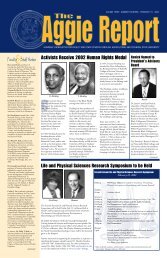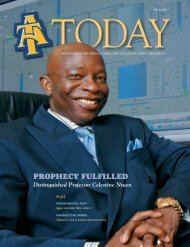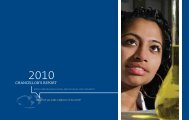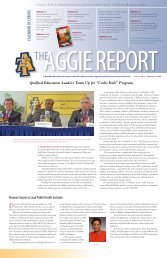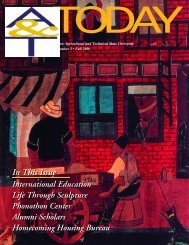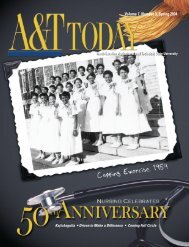The First Five Years • Crossing The Line • Curtain Call
The First Five Years • Crossing The Line • Curtain Call
The First Five Years • Crossing The Line • Curtain Call
Create successful ePaper yourself
Turn your PDF publications into a flip-book with our unique Google optimized e-Paper software.
Sheila M. Whitley is an assis-<br />
tant professor and coordina-<br />
tor of broadcast production in<br />
the department of journalism<br />
and mass communication at<br />
N.C. A&T. Other perspectives<br />
on the South Africa trip will<br />
be featured in a future edition<br />
of A&T Today.<br />
32<br />
A&T TODAY<br />
Fall 2004<br />
Mixed Bag<br />
<strong>The</strong> Epiphany of a White American<br />
Traveling to Black South Africa<br />
By Sheila M. Whitley, Ph.D.<br />
On May 9, I boarded a plane with three North Carolina A&T State University colleagues<br />
and eight of our students for the trip of a lifetime. We were traveling to South<br />
Africa to join two faculty members from the department of visual and performing arts.<br />
As the only white woman on the trip, I had many trepidations. Recalling South Africa’s<br />
recent history, the minority white population subjugated the majority black population<br />
for decades. Could their history be a problem for me and jeopardize my safety?<br />
Surely, this country still had fresh wounds and memories from the Apartheid era.<br />
Prophetically, we arrived in Johannesburg on May 10, the 10 th anniversary of the end<br />
of Apartheid. I soon discovered the black South Africans embrace their struggle and<br />
history and don’t allow it to anchor them in bitterness. <strong>The</strong>y are using their struggle to<br />
soar them to higher levels.<br />
I asked many black South Africans if they were bitter or hostile. I always got a similar<br />
answer, “No, that was then. Now, we all are free and must unite so we can move forward.”<br />
This attitude spread throughout South Africa on the wave of Nelson Mandela’s<br />
inspired vision for a free and united South Africa. Mandela wants a South Africa that<br />
is home to ALL who are called South Africans – regardless of race.<br />
I am amazed that a country 10 years into democracy has healed so much and the<br />
progress it’s made in race relations. I was in South Africa for only 11 days, so I know I<br />
didn’t see the racism that surely exists. I did see a country working very hard to move<br />
forward and heal.<br />
In our country, the Civil Rights Movement happened 40 some years ago. After my trip,<br />
I realize how much it hurts for me to see more wounds, scars, bitterness and hostilities<br />
in my homeland than in South Africa. We’ve had three more decades to heal and unite.<br />
South Africa was more beautiful than I imagined. I am grateful I had the opportunity<br />
to visit the country.<br />
After witnessing a country with a heart and desire to achieve freedom, equality and<br />
unity for all her children, I long to see the same thing in my homeland – the United<br />
States of America. I think it is time for OUR country to unify and heal. In addition to<br />
our cries, we need our leaders to proclaim these United States of America a free, equal<br />
and united home to ALL who call themselves citizens of this country.


